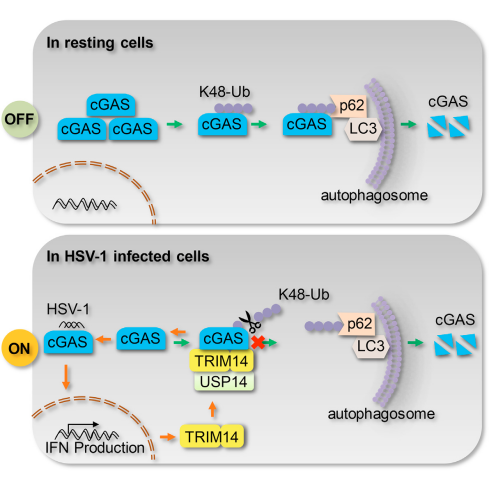
Principal Investigator
Cell biology
chenmx@szbl.ac.cn
2021 - PresentShenzhen Bay Laboratory Junior Principal Investigator
2018 - 2021Yale University, USA Postdoctoral Fellow
2013-2018Sun Yat-sen University PhD
2009-2013Shantou University Bachelor
Our long-term objectives are to decipher the anti-bacterial or anti-viral effect of intracellular metabolism. Our research is focused on understanding the pathogenesis of pathogens (bacteria and virus) and how innate immunity or cell-autonomous immunity resists microorganisms.
Some specific research interests of the lab include:
1. Pathogenesis of Salmonella.
2. Immune responses to Salmonella infection.
3. Screening and identification of new antimicrobial metabolites.
Dr. Meixin Chen earned her Ph.D. in Cell Biology from Sun Yat-sen University in 2018. She joined the laboratory of Dr. Jorge E. Galán, a member of the USA National Academy of Science, at Yale University School of Medicine as a postdoctoral researcher, during which she focused on understanding of how pathogens interact with their hosts. Dr. Meixin Chen and her colleagues found that the mitochondria-derived metabolite itaconate targeted Salmonella containing vacuoles. This study placed the intracellular metabolism in the center of cell-autonomous defenses and was published in Science. Dr. Meixin Chen has been studying innate immune responses for many years, and in addition to Salmonella, she has worked on how DNA virus or RNA virus interacts with their hosts. Dr. Meixin Chen, as a first author, has published several articles in Science, Molecular Cell, and Advanced Science.

Meixin Chen, et al. Itaconate is an effector of a Rab GTPase cell-autonomous host defense
pathway against Salmonella. Science 369.6502 (2020): 450-455.

Meixin Chen, et al. TRIM14 inhibits cGAS degradation mediated by selective autophagy receptor p62 to promote
innate immune responses[J]. Molecular Cell, 2016, 64(1): 105-119.
Representative papers:
Chen M., Sun H, Boot M, Lin S, Chang SJ, Wang W, Lam TT, Lara-Tejero M, Rego EH, Galán JE*. Itaconate is an effector of a Rab GTPase cell-autonomous host defense pathway against Salmonella.Science. 2020 Jul 24;369(6502):450-455. (IF=47.728)
Chen M., Zhao, Z., Meng, Q., Liang, P., Su, Z., Wu, Y., Huang, J. and Cui, J. *, 2019. TRIM14 Promotes Noncanonical NF‐κB Activation by Modulating p100/p52 Stability via Selective Autophagy. Advanced Science, p.1901261. (IF=16.806)
Chen M., Meng, Q., Qin, Y., Liang, P., Tan, P., He, L., Zhou, Y., Chen, Y., Huang, J., Wang, R.F. and Cui, J. *, 2016. TRIM14 inhibits cGAS degradation mediated by selective autophagy receptor p62 to promote innate immune responses. Molecular cell, 64(1), pp.105-119. (IF=15.584)
Huan Lia, Donghyun Park, Meixin Chen, Florian Schueder, Maria Lara-Tejero, Jun Liu, Jorge E. Galán*, Parkinson’s disease kinase LRRK2 coordinates a cell-intrinsic itaconate-dependent defence pathway against intracellular Salmonella. Nature Microbiology, 8(10), 1880-1895.
Liu, T., Zhou, Y., Wang, L., Li, L., Bao, Q., Tian, S., Chen, M., Chen, H., Cui, J. * and Li, C.W. *, 2019. NOD-like receptor family, pyrin domain containing 3 (NLRP3) contributes to inflammation, pyroptosis, and mucin production in human airway epithelium on rhinovirus infection. Journal of Allergy and Clinical Immunology, 144(3), pp.777-787. (IF=14.1)